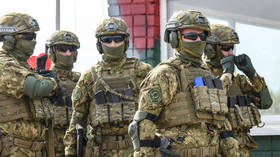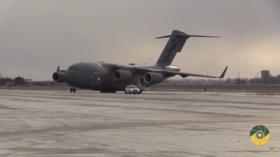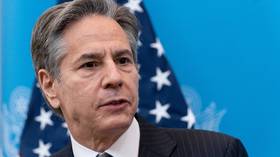The CIA’s high-stakes game in Ukraine

With fears of a conflict breaking out between Russia and Ukraine, there has been no end of speculation about how the standoff could spiral into all-out fighting. Some of the theories and purported plans come with evidence, others don’t – but in their own way, they’re all intriguing.
Not surprising, but still revealing, are reports that the CIA have trained special forces in Ukraine to defend the country against a possible invasion. In all likelihood, the scheme would have included far-right fighters. Through well-timed leaks and statements by anonymous “persons familiar” and conveniently retired US officers, these trainees are now presented as the potential backbone of a guerrilla-style resistance force.
The purpose of advertising this fact now is clear: to deter Russia from launching that large-scale attack on Ukraine that Washington alleges is coming, Moscow denies planning but won’t rule out either, and Kiev cannot really make up its mind about: If you, Russia, occupy substantial parts of Ukrainian territory, so goes the American message, we’ll turn this into a bloody quagmire for you. In essence, what the late US national security adviser Zbigniew Brzezinski was always proud of having done in – and to – Afghanistan during the Soviet intervention there in the 1980s.
The training program was started under Obama and extended under Trump (another nail in the coffin of claims he was a Russian agent) and then Biden. It inhabits a twilight world of ambiguous terminology and not very plausible deniability. Somehow it’s all very defensive, allegedly, but then again, in reality it is, of course, not – and no one is actually supposed to buy the cover story because then it would have little deterrence value. The “tactical skills” taught in such programs are, of course, at least as useful for attack and sabotage as for “mere” intelligence gathering and defense.
Never mind that there is a “good chance that the CIA is training actual, literal Nazis,” as Jacobin has put it, entirely realistically: If you have any idea at all about the virulence and the modus operandi of the Ukrainian far right, then you know that this is exactly the opportunity its cadres crave. And if you have any realism left about what the CIA does, then you know that it does not mind training fanatics. Never did, from Latin America via Afghanistan to Syria and Ukraine. In fact, if anything the Agency has a massive bias for them.
Moreover, we have had reliable information about this phenomenon before. In fact, it is even larger. Last September, a detailed and solidly researched report for the Illiberalism Studies Program at George Washington University’s Institute for European, Russian and Eurasian Studies found that members of Ukrainian far-right organizations such as Centuria and the Azov Battalion both systematically infiltrate the country’s military and receive plenty of training by Western countries, including at elite institutions such as Britain’s Sandhurst and Germany’s Offizierschule des Heeres.
Put differently, Ukraine’s far right deliberately uses the leverage it gains by Western training, connections, and de facto approval or, at least, benevolent toleration to increase its already substantial influence in the country’s politics and armed forces. Meanwhile, American right-wing extremists have shown an ever greater interest in Ukraine.
The potential upshot is predictable: If a short-sighted strategy of making nationalist and far-right fighters the spearhead of systematic guerrilla resistance should ever be implemented, the long-term effects would be devastating, and could quite possibly include a nasty blowback into US society itself. None of this information, it is worth underlining, originates with Russian media. All of it comes from the West. None of this is hyperbole, “information war,” or whatever lazy label commonly used to dismiss inconvenient news about the West and Ukraine. If you want to ignore these risks, go ahead. But in that case, just own your neo-Cold War bias and ignorance, please. And don’t be surprised when things go terribly wrong, again, on a proxy battlefield of West-Russia conflict.
Against this background, a recent article in the British Times also begins to make – sort of – sense. Despite a cursory nod to the well-known human rights abuses committed by far-right Ukrainian formations, its main point is that their fighters have their national role to play when it comes to defending the country against separatists or Russia. And, indeed, with Ukraine’s president bestowing highest military honors on them, how dare we doubt?
Expect more of this in the future: Our media will now not only ignore or downplay the reality of the Ukrainian far right – as always by dismissing any discussion of it as “Russian disinformation” – but make us learn to love it as long as it’s “our” far right, fighting on “our” side of the “new Cold War,” or hot one, as the case may be.
None of this is surprising. In fact, to use a cliché commonly applied to Russia, this is all from the classic Cold War playbook of the West, in particular the USA: a ruthless logic of “my enemy’s enemy is my friend” and an equally ruthless readiness to “destroy the village to save it.”
Because, of course, supporting a regular army, in Ukraine or elsewhere, is one thing. Supporting a guerrilla-style insurgency is a very different one: It necessarily would come with cruel consequences for Ukraine’s civilians. Russia would qualify partisan-style attacks as terror – as every state, including of course the USA and, for instance, Israel routinely does now – and respond massively. You can be certain that there are cynics in the West who would welcome the resulting reports of “Russian atrocities” as information-war ammunition. Too realistic a picture for you? Too ugly? Don’t shoot the messenger.
Organizing partisan resistance would also have the capacity to split Ukraine. For, whatever you may have been told, there really are important regional differences in the country. While many Ukrainians may well generally support resisting an invasion, the call to engage in partisan warfare against an occupation may divide them much more.
And then? A guerrilla war waged by western Ukrainians in occupied eastern Ukraine, with the local population caught between enraged occupation troops and national partisans demanding loyalty at gunpoint? If you think that that’s a strange scenario, then you have no idea about how insurgencies operate in general. You also must have missed that even in western Ukraine the anti-Soviet insurgents of the post-World War Two years killed at least as many fellow Ukrainians as Soviets. Guess why.
In sum, to openly speculate about or call for guerrilla war is not a sign of support. Don’t be naïve: it’s a sign that Washington would be ready to turn Ukraine into hell on Earth if only it can embarrass Russia. If you like seeing Ukrainians reduced to pawns coldly sacrificed for this sort of geopolitics, just be honest and don’t sell it as an act of friendship.
The statements, views and opinions expressed in this column are solely those of the author and do not necessarily represent those of RT.
The statements, views and opinions expressed in this column are solely those of the author and do not necessarily represent those of RT.















